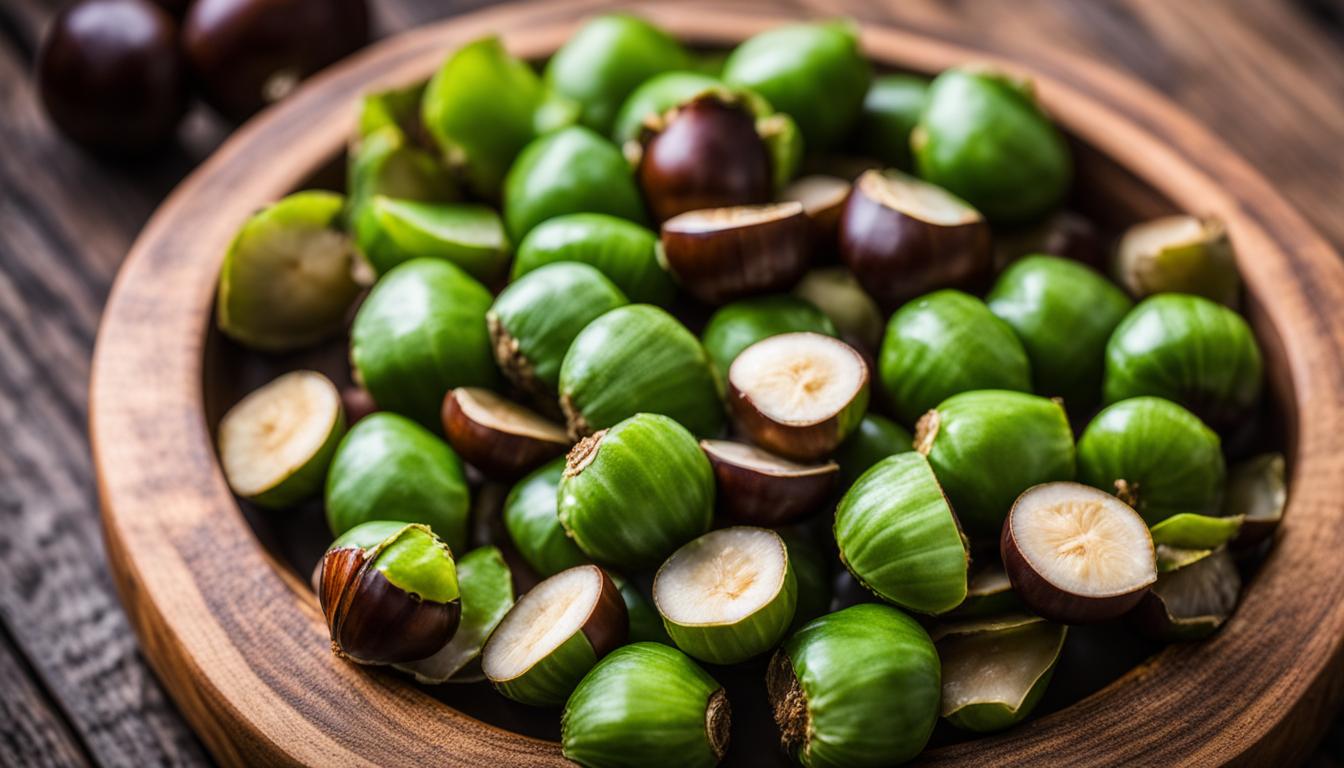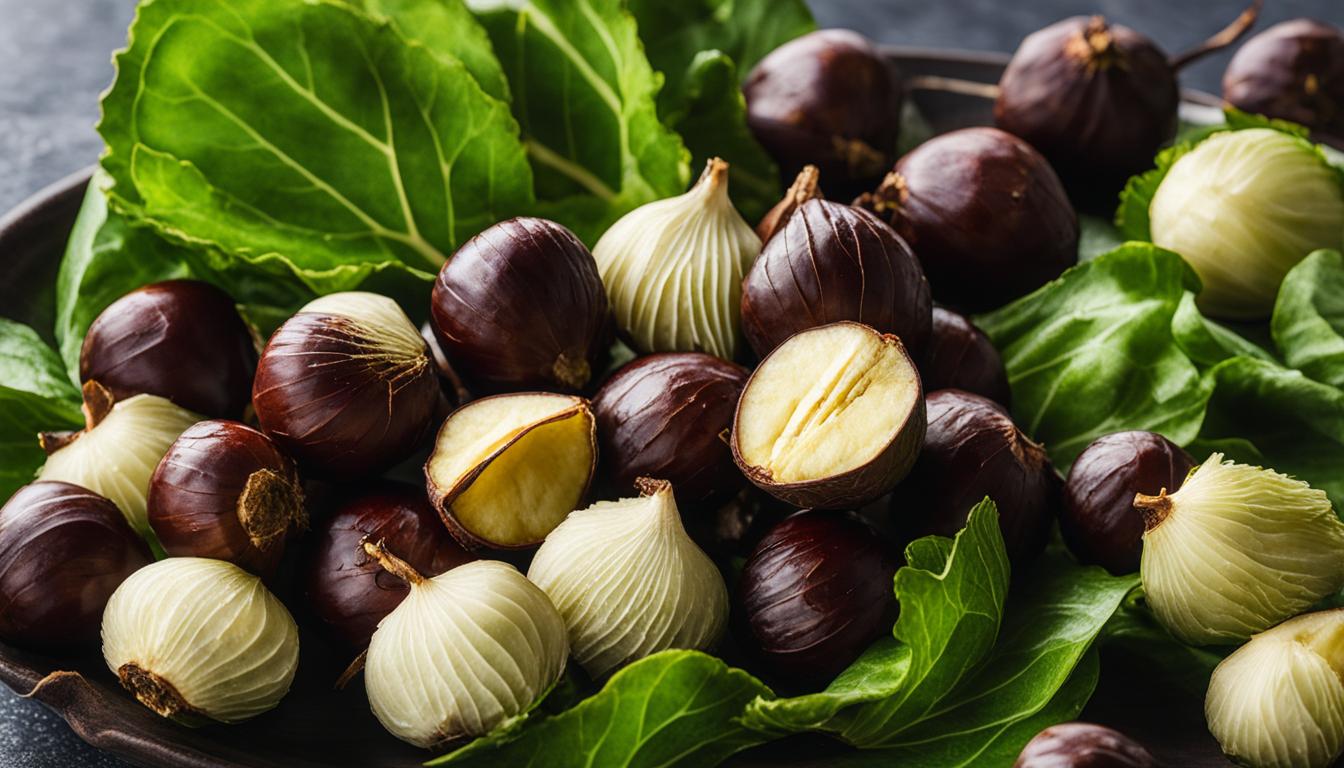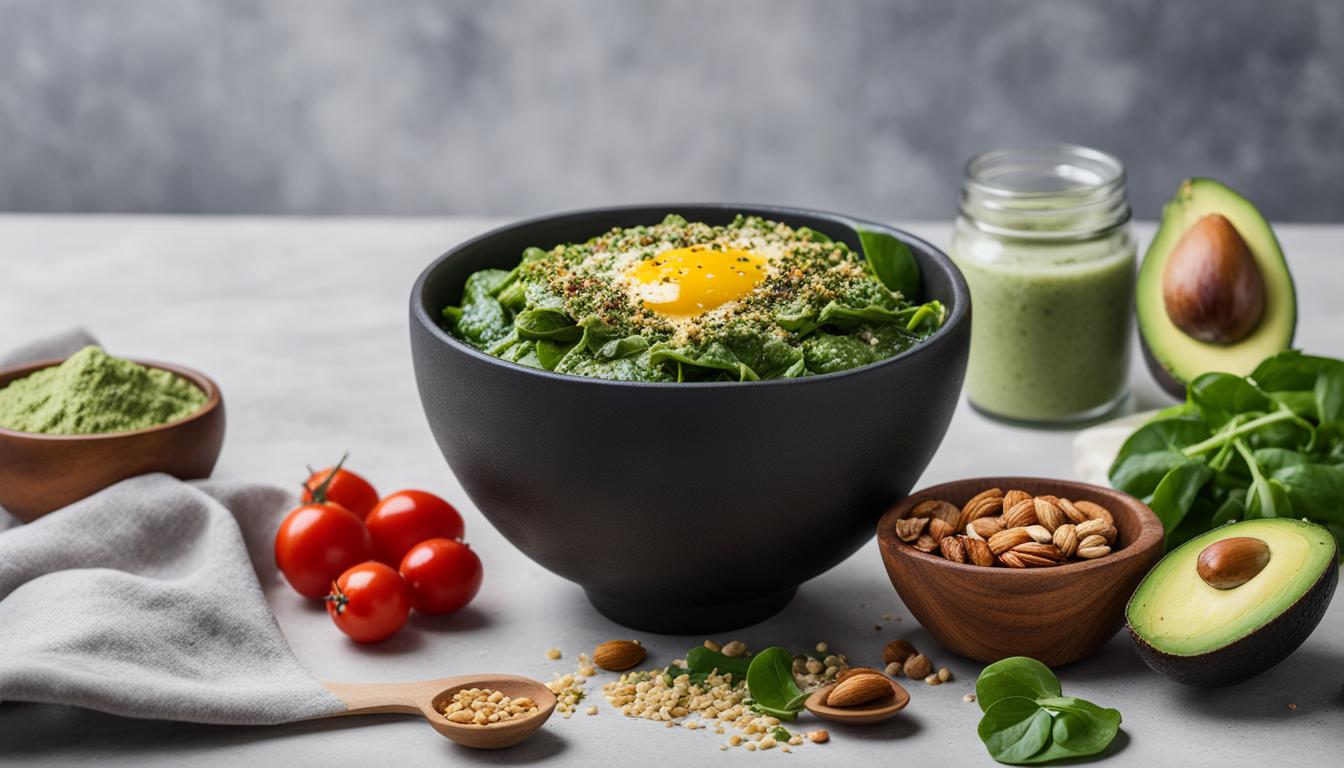Thinking about incorporating water chestnuts into your keto diet? Before you do, it’s important to understand the low-carb facts about these crunchy vegetables. While water chestnuts may be a popular ingredient in Chinese cuisine, they may not align with the principles of a ketogenic diet due to their relatively high carbohydrate content.
Water chestnuts, also known as Chinese water chestnuts, have a slightly sweet taste and provide a satisfying crunch to dishes. However, they contain approximately 24 grams of carbohydrates per 100 grams, which exceeds the recommended daily limit for net carbs on a keto diet. It’s essential to consider portion sizes and your overall carbohydrate intake when incorporating water chestnuts into your keto meal plan.
Key Takeaways:
- Water chestnuts are not considered keto-friendly due to their high carbohydrate content.
- They contain about 24 grams of carbs per 100 grams, exceeding the daily net carb limit on a ketogenic diet.
- Portion sizes and overall carbohydrate intake must be carefully considered when including water chestnuts in a keto meal plan.
What Are Water Chestnuts?
Water chestnuts, also known as Chinese water chestnuts, are harvested from the bulb of the water chestnut plant. They are not nuts but rather tuber vegetables with a crunchy texture and a slightly sweet flavor.
Water chestnuts are low in calories and high in water content, making them a refreshing addition to meals. They can be enjoyed raw, cooked, or added to various dishes for their unique texture and taste.
These tuber vegetables offer a multitude of health benefits due to their nutrient profile. They are packed with essential vitamins and minerals, providing a boost of nutrition to your diet.
Here is a breakdown of the key nutrients found in water chestnuts:
| Nutrient | Amount per 100g |
|---|---|
| Vitamin B6 | 0.2mg |
| Potassium | 584mg |
| Copper | 0.2mg |
| Manganese | 0.5mg |
While water chestnuts offer these nutritional benefits, they are primarily made up of carbohydrates. It’s important to note that the glycemic index of water chestnuts has not been measured, but they are likely to raise blood sugar levels due to their high carbohydrate content.
Despite their potential impact on blood sugar levels, water chestnuts can still be enjoyed in moderation as part of a balanced diet. They can provide a satisfying crunch and add flavor to a variety of dishes.
“Water chestnuts are a versatile ingredient that can enhance the taste and texture of your meals while providing essential nutrients.”
However, if you are following a strict keto diet or need to closely monitor your carbohydrate intake, it’s important to consider alternatives that are lower in carbs and better suited for your dietary needs.
Summary
Water chestnuts are tuber vegetables known for their crunchy texture and slightly sweet flavor. While they offer health benefits and essential nutrients like vitamin B6, potassium, copper, and manganese, they are primarily composed of carbohydrates. It’s important to moderate their consumption, especially if you’re on a strict keto diet. Consider alternatives or incorporate water chestnuts into a well-balanced diet that aligns with your health goals.
The Benefits of Water Chestnuts
Despite their high carbohydrate content, water chestnuts offer several health benefits. They are rich in antioxidants, such as catechins and ferulic acid, which can help reduce oxidative stress and prevent lipid peroxidation. These antioxidants play a crucial role in maintaining overall health and protecting against chronic diseases.
One of the significant health benefits of water chestnuts is their potassium content. Potassium is an essential mineral that helps regulate blood pressure, support heart health, and maintain proper muscle and nerve function. Including water chestnuts in your diet can help meet your daily potassium needs.
Additionally, water chestnuts are a good source of dietary fiber. Fiber is crucial for maintaining a healthy digestive system, regulating bowel movements, and promoting feelings of fullness. By including water chestnuts in your meals, you can increase your fiber intake and support digestive health.
Another notable nutrient found in water chestnuts is vitamin B6. Vitamin B6 is involved in various bodily functions, including immune function and neurotransmitter production. By incorporating water chestnuts into your diet, you can ensure an adequate intake of this essential vitamin.
Water chestnuts are packed with antioxidants, potassium, dietary fiber, and vitamin B6, offering a range of health benefits for those who include them in their diet.

Vitamin B6 Content in Water Chestnuts
| Vitamin B6 | Amount per 100g |
|---|---|
| Water Chestnuts | 0.7 mg |
| Bananas | 0.4 mg |
| Avocados | 0.3 mg |
| Spinach | 0.2 mg |
In comparison to other foods, water chestnuts are an excellent source of vitamin B6. Just 100 grams of water chestnuts provide 0.7 mg of vitamin B6, surpassing the amounts found in popular fruits and vegetables like bananas, avocados, and spinach.
It’s important to note that while water chestnuts offer these health benefits, their high carbohydrate content should be balanced with individual dietary requirements and goals, especially when following a keto diet.
Water Chestnuts and Carbohydrate Content
When it comes to the carbohydrate content of water chestnuts, it’s important to note that they are primarily composed of carbohydrates, with only small amounts of fat and protein. In fact, water chestnuts contain approximately 24 grams of total carbohydrates per 100 grams. Out of these, around 3 grams are dietary fiber, which means the net carb content is approximately 21 grams per 100 grams.
While water chestnuts can provide some nutritional benefits, it’s essential to be mindful of their impact on blood sugar levels. Although the glycemic index of water chestnuts has not been measured, starchy foods like water chestnuts tend to have a higher glycemic index. While the fiber content in water chestnuts can help lower the glycemic response, they are still considered high in carbohydrates and may potentially impact blood sugar levels.
The Nutritional Breakdown of Water Chestnuts
| Nutrition Facts (per 100 grams) | Amount |
|---|---|
| Calories | 97 |
| Total Carbohydrates | 24 grams |
| Dietary Fiber | 3 grams |
| Fat | 0.1 grams |
| Protein | 1.4 grams |
Source: USDA FoodData Central
While the carbohydrate content of water chestnuts should be taken into consideration when following a keto diet or managing blood sugar levels, they still offer a crunchy and tasty addition to meals. It’s important to balance your carbohydrate intake from various sources when including water chestnuts in your diet.
Water Chestnuts and Nutritional Profile
When it comes to nutrition, water chestnuts offer a variety of vitamins and minerals that can benefit your overall health. They are particularly rich in essential nutrients such as vitamin B6, potassium, copper, and manganese. Let’s take a closer look at the nutritional profile of water chestnuts:
| Nutrient | Amount per 100g |
|---|---|
| Vitamin B6 | 0.2mg |
| Potassium | 584mg |
| Copper | 0.3mg |
| Manganese | 0.6mg |
| Magnesium | 13mg |
| Calcium | 13mg |
| Iron | 0.6mg |
| Zinc | 0.1mg |
In addition to these minerals, water chestnuts also provide small amounts of other nutrients such as magnesium, calcium, iron, and zinc.
Vitamin B6, found in water chestnuts, plays a crucial role in energy metabolism and brain function, while potassium is essential for maintaining fluid balance and nerve function. Copper contributes to collagen synthesis and immune function, while manganese is necessary for bone health and metabolism.
Despite their impressive nutritional profile, it’s important to note that the high carbohydrate content of water chestnuts may not be suitable for individuals following a keto diet.
Water Chestnuts in a Keto Diet
While water chestnuts may not be the best choice for a strict keto diet due to their high carbohydrate content, they can still be incorporated in moderation. It’s important for keto dieters to monitor their carbohydrate intake and stay within their daily limit, typically around 20 grams of net carbs.
If you choose to include water chestnuts in your keto meal plan, it’s crucial to consider portion sizes and adjust your carb intake from other sources accordingly. Tools like carb counting apps and meal planning can help you manage your daily carbohydrate allowance and ensure you stay in ketosis.
Remember, the key to a successful keto diet is carb counting and mindful carbohydrate intake. By properly tracking your carbs and making smart choices, you can enjoy a variety of foods while still achieving your weight loss and health goals.
| Food | Carbohydrate Content per 100g | Dietary Fiber per 100g | Net Carbs per 100g |
|---|---|---|---|
| Water Chestnuts | 24g | 3g | 21g |
| Fresh Bamboo Shoots | 3g | 2g | 1g |
| Fennel Roots | 7g | 3g | 4g |
| Daikon Radishes | 4g | 2g | 2g |
As you can see, water chestnuts have a significantly higher carbohydrate content compared to other low-carb alternatives. However, by making thoughtful choices and adjusting portion sizes, you can still enjoy the unique texture and flavor of water chestnuts without compromising your ketogenic diet. Remember to consult with a healthcare professional or registered dietitian for personalized guidance and support on your keto journey.

Alternatives to Water Chestnuts on a Keto Diet
If you’re following a keto diet and looking for low-carb alternatives to water chestnuts, there are several options to consider. Fresh bamboo shoots, fennel roots, and daikon radishes are all great choices that provide a similar crunch and texture in your meals.
Fresh bamboo shoots have about 9 grams of net carbs per cup, making them a suitable replacement for water chestnuts. They can be stir-fried or added to salads for a burst of freshness and a satisfying crunch.
Fennel roots are another low-carb alternative, with only 2 grams of net carbs per cup. They have a mild licorice flavor and a crunchy texture, making them a versatile ingredient for salads or roasted vegetable medleys.
Daikon radishes, with approximately 9 grams of net carbs per cup, are also a great substitute for water chestnuts. They can be sliced or grated and used in stir-fries or as a crunchy addition to salads.
These low-carb alternatives offer a variety of flavors and can be easily incorporated into your ketogenic meal plan. Here’s a table summarizing the net carb content of these alternatives:
| Low-Carb Alternatives | Net Carbs per Cup |
|---|---|
| Fresh Bamboo Shoots | 9 grams |
| Fennel Roots | 2 grams |
| Daikon Radishes | 9 grams |
References:
- Source 1
- Source 2
- Source 3
These low-carb alternatives provide a delicious and low-carb way to enjoy the same texture and crunch as water chestnuts. Experiment with these options and create flavorful keto meals while staying within your carbohydrate limits.
Incorporating Water Chestnuts in a Balanced Diet
While water chestnuts may not be ideal for a strict keto diet, they can still be enjoyed as part of a balanced diet. The dietary fiber in water chestnuts can contribute to digestive health and promote feelings of fullness, while the low glycemic index can aid in blood sugar control. When incorporating water chestnuts into your meals, it’s important to consider the overall composition of your diet. Pairing water chestnuts with other low-carb vegetables, healthy fats like olive oil, and a moderate amount of protein can create a well-rounded and satisfying meal.
Including water chestnuts in a balanced diet allows you to benefit from their nutritional value while managing your carbohydrate intake. Here are some tips for incorporating water chestnuts into your meals:
- Add water chestnuts to stir-fries: Use water chestnuts as a crunchy addition to your stir-fried dishes. They can add texture and flavor without adding excessive carbohydrates.
- Include water chestnuts in salads: Slice water chestnuts and toss them into your favorite salads. They can provide a refreshing crunch and pair well with greens and other vegetables.
- Create a water chestnut side dish: Boil or steam water chestnuts until tender and serve them as a nutritious side dish. Season with herbs and spices to enhance their flavor.
- Try water chestnut snacks: Roast water chestnuts in the oven with a sprinkle of salt and spices for a healthy and satisfying snack option.
By incorporating water chestnuts into your diet alongside other low-carb vegetables, healthy fats, and a moderate amount of protein, you can enjoy their unique taste and textures while maintaining a balanced approach to your overall nutrition.
Conclusion
While water chestnuts may not be considered keto-friendly due to their high carbohydrate content, they can still be enjoyed in moderation as part of a balanced diet. Despite their impact on blood sugar levels, they offer several health benefits and can be a valuable addition to your meals.
Water chestnuts are a good source of vitamins, minerals, and dietary fiber. They provide essential nutrients such as potassium, vitamin B6, and copper, which support various bodily functions. Their dietary fiber content aids in digestion and promotes feelings of fullness.
If you choose to incorporate water chestnuts into your diet, it’s important to be mindful of portion sizes and adjust your carbohydrate intake from other sources accordingly. Monitoring your overall carbohydrate content is crucial, especially if you’re following a strict keto diet.
For personalized guidance and advice on your weight loss journey, it’s recommended to consult with a healthcare professional or registered dietitian. They can provide tailored recommendations based on your specific needs and goals.
FAQ
Are water chestnuts keto friendly?
Water chestnuts are not considered keto friendly due to their high carbohydrate content.
What are water chestnuts?
Water chestnuts are tuber vegetables with a crunchy texture and slightly sweet flavor.
What are the benefits of water chestnuts?
Water chestnuts are rich in antioxidants, potassium, dietary fiber, and vitamin B6.
What is the carbohydrate content of water chestnuts?
Water chestnuts contain about 24 grams of carbohydrates per 100 grams.
What is the nutritional profile of water chestnuts?
Water chestnuts are a good source of vitamins, minerals, and dietary fiber.
Can water chestnuts be included in a keto diet?
While water chestnuts are high in carbohydrates, they can be incorporated in moderation into a keto meal plan.
What are some alternatives to water chestnuts on a keto diet?
Fresh bamboo shoots, fennel roots, and daikon radishes are low-carb alternatives to water chestnuts.
How can water chestnuts be incorporated into a balanced diet?
Water chestnuts can be included as part of a balanced diet by pairing them with other low-carb vegetables and healthy fats.
Are water chestnuts suitable for a weight loss diet?
While water chestnuts have some health benefits, their high carbohydrate content should be considered in a weight loss diet.


